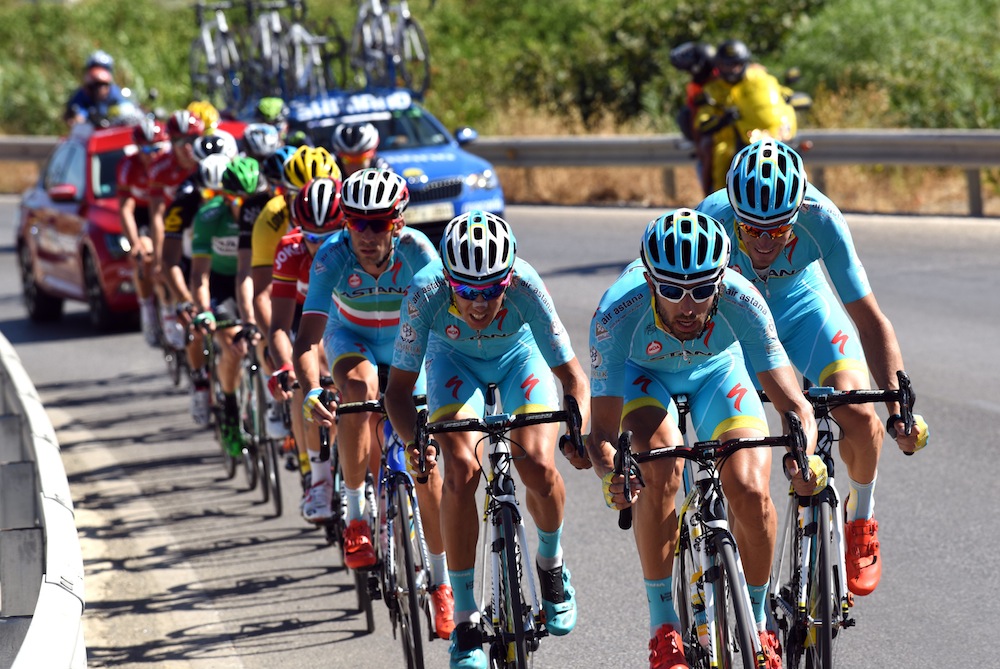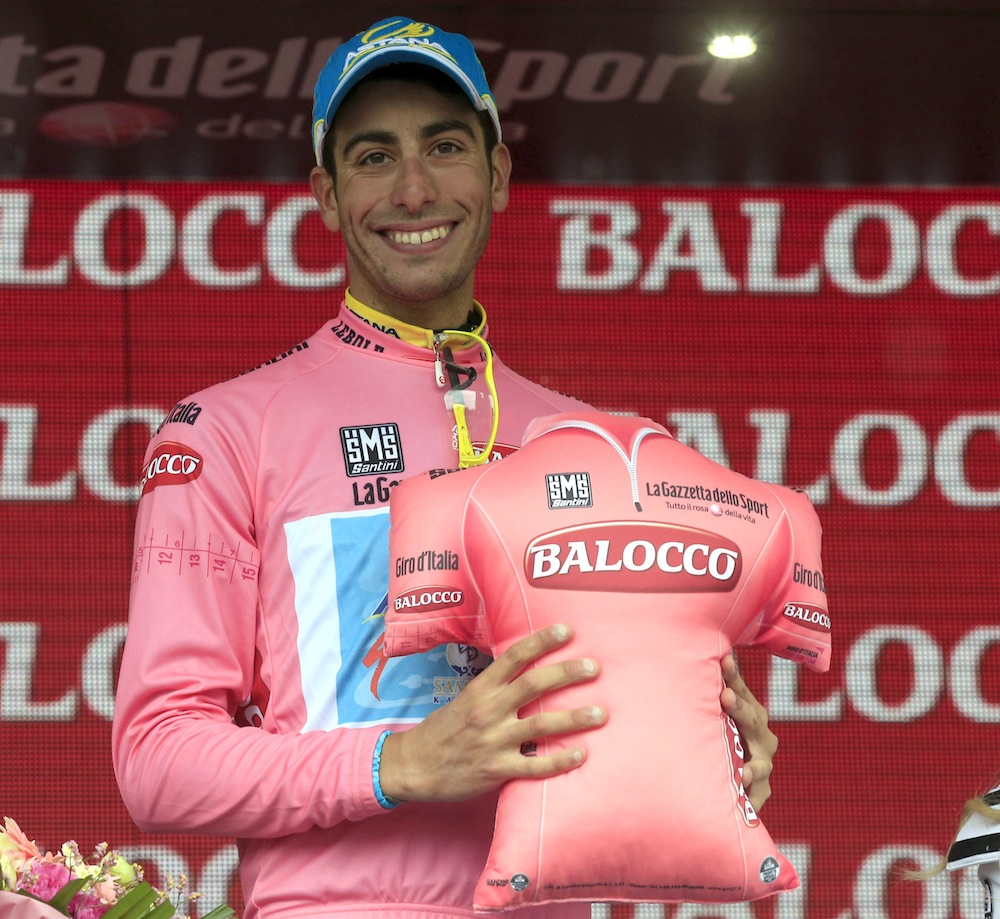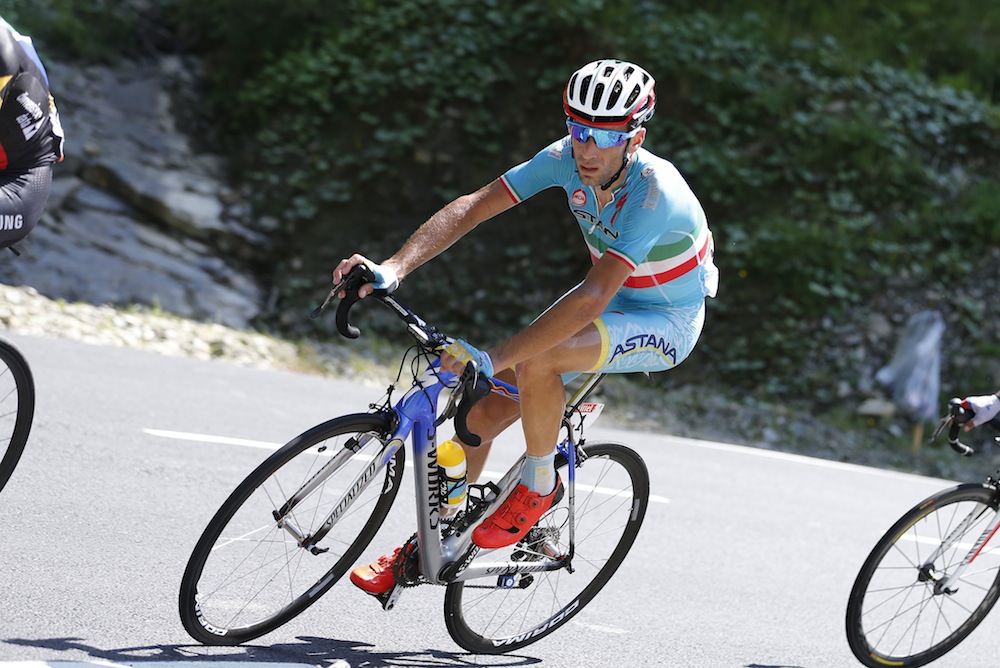Nibali's Vuelta a España disqualification caps difficult year for Astana
Can Astana pick themselves up again after Vincenzo Nibali's ejection from the Vuelta a España in a season of ups and downs for the team?

Astana chases on stage two of the 2015 Tour of Spain
The latest race content, interviews, features, reviews and expert buying guides, direct to your inbox!
You are now subscribed
Your newsletter sign-up was successful
Movies based on the world of cycling are rarely very good, but should someone write a screenplay of Astana's turbulent season they could strike cinematic gold.
We've had doping scandals, confusion in the ranks, managers criticising riders, poor results, great results and now a disqualification from a Grand Tour - all while under the highest scrutiny from the UCI and cycling fans.
The Kazakh team's problems started in the winter of 2014, when brothers Maxim and Valentin Iglinsky were kicked off the team after testing positive for EPO, with several development team riders also testing positive to muddy the Astana name further.
The tough anti-doping stance taken by UCI president Brian Cookson led to the governing body recommending to the impartial Licence Commission that Astana's right to race in the WorldTour should be stripped, leading to months of legal wranglings and 'will they, won't they' that stretched deep into the new season.
An audit by the Institute of Sports Science at the University of Lausanne (ISSUL) was the thing that ultimately led to Astana keeping their licence, despite the fact that the report into team practices didn't paint the organisation in the best light. ISSUL concluded that the team's problems were more down to ignorance than a systematic doping regime on the scale of US Postal Service.
ISSUL and the Licence Commission agreed that Astana should keep their licence on the proviso that the university continued to work with the team to get it back on track. This wasn't too popular in the world of cycling, though, with the likes of Team Sky's Sir Dave Brailsford backing the UCI's stance to kick the team off the WorldTour.
Many cycling fans, meanwhile, were left disenchanted as another team escaped any real punishment for doping offences, having seen Katusha slip through the net in 2013 and several other doping scandals going under the radar.
The latest race content, interviews, features, reviews and expert buying guides, direct to your inbox!

With the green light to continue on their way for the rest of the season, Astana went into the Giro d'Italia with high hopes of taking the overall win with Fabio Aru - the young Italian who finished third and fifth in the Giro and Vuelta respectively in 2014.
Even with Alberto Contador dislocating his shoulder in the first week, Aru wasn't able to put any significant time into his rival, unable to dethrone the Spaniard at the top of the standings until stage 13. He handed all that time back on the following stage's long time trial and then saw his title chances virtually buried by losing more than two minutes on stage 16 - won by teammate and new threat Mikel Landa.
By stage 19 the Italian was six minutes down on Contador and even two consecutive stage wins in the mountains to end the race couldn't see him recover from that.
For many teams, five stage wins and two podium places in a Grand Tour would be seen as a good result, but there's always the feeling that only a win in the general classification is enough for it to be considered a successful tour.
That feeling was strengthened at the Tour de France, when team manager Alexandre Vinokourov seemed to strip defending champion Vincenzo Nibali of the team leadership after a poor performance on stage 10, handing the baton to Jakob Fuglsang, who did even worse than Nibali the following day.
“Vincenzo needs a good mechanic because something is broken in his head,” Vinokourov said after stage 10, when the Italian couldn't match Chris Froome's stage-winning attack, finishing four minutes down on the winner.

It's not the kind of motivational tactic we see very often in sport - a manager openly slating his athlete after a poor day at the office - and rumours quickly circulated that Nibali's time at Astana could be limited.
The team was already treading on eggshells after Lars Boom returned high cortisol levels in a pre-Tour test, which under the guidelines of the MPCC - of which Astana were part of - meant the team would have to withdraw the Dutchman from competition for eight days.
With no option to replace him in their nine-man team at such short notice, Astana just ignored the MPCC rules, started the race with nine men and then accepted their suspension from the organisation - a small price to pay in the search for victory.
While Nibali regained the leadership by default after stage 11 - where Fuglsang lost 10 minutes - his chances of winning the race were pretty much over. With the pressure off, like Aru in the Giro, Nibali somewhat salvaged his Tour by winning up La Toussuire on stage 19, moving him to fourth overall in the race.
Astana's desire to win the final Grand Tour of the year was evident as they named Nibali, Aru and Landa in their Vuelta a España superteam. But even a team as strong as that couldn't do things the easy way, with Nibali ejected from the race after just two days.
Having been held up in a crash, Nibali was caught on television holding on to his team car and being helped on his way back towards the main peloton. It's something that happens all the time in races, so the team argued, but rarely is it caught on camera and thus rarely are riders actually punished for it.
“I thought I’d get a hefty fine and kicked down the classification. I would’ve accepted a penalty of 10 minutes! After all, I’m not the first or the last in this type of story," Nibali wrote on Facebook after the announcement.
Yet again Astana face having to haul themselves up when they've been kicked down. With 19 stages still to come in the race it's unfair to write the team off yet, but with one significant team member now on the way home their task has become a lot harder.
Will stage wins from Aru and Landa be enough to temper the team's expectations? Or will only a GC win be enough to qualify it as a success?
Stuart Clarke is a News Associates trained journalist who has worked for the likes of the British Olympic Associate, British Rowing and the England and Wales Cricket Board, and of course Cycling Weekly. His work at Cycling Weekly has focused upon professional racing, following the World Tour races and its characters.